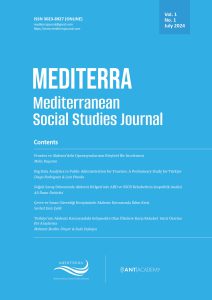Big Data Analytics In Public Administration For Tourism: A Preliminary Study For Türkiye
Diego Rodriguez & Luis Pineda
Abstract
This preliminary study explores the use of Big Data analytics in the public administration of Türkiye’s tourism sector, focusing on the extraction and analysis of visitor reviews from the TripAdvisor platform. The primary objective is to compile a comprehensive database of records for 262 museums and archaeological sites, managed by the Turkish Ministry of Culture and Tourism, distributed across 64 provinces. Using web scraping techniques, over 72,500 reviews written in English were collected, representing approximately 49% of the total available reviews for these attractions. he methodology involves sentiment analysis to assess visitor perceptions, highlighting both positive and negative feedback. The analysis identifies common themes such as the admiration for historical and cultural significance, and criticisms regarding logistical issues like ticket
prices and crowd management. The study emphasizes the importance of such detailed feedback in informing public decision-making processes, aiming to enhance the quality and appeal of Türkiye’s diverse tourism offerings. Findings from this analysis reveal that reviews are heavily concentrated in major tourist hubs such as Istanbul, Antalya, and Izmir, with attractions like the Ayasofia Museum/Mosque and Topkapı Palace receiving the most feedback. This geographical and thematic concentration of reviews provides valuable insights into visitor preferences and areas requiring improvement. The study concludes that integrating Big Data analytics into public administration can significantly benefit the tourism sector, leading to better-informed policies and strategic enhancements that could boost tourism revenues and visitor.
Keywords: Big Data, Tourism, Web Scraping, Sentiment Analysis, Türkiye.
References
Agüero-Torales, M. M., Cobo, M. J., Herrera-Viedma, E., & López-Herrera, A. G. (2019). A cloud-based tool for sentiment analysis in reviews about restaurants on TripAdvisor. Procedia Computer Science, 162, 392-399.
Almeida, R. de & Abrantes, R.M. (2018). The development of tourism indicators through the use of social media data: the case of Minas Gerais. Brazil Information Research, 23(4), paper 805.
Balıkoğlu, A., Ulusoy-Yıldırım, H., & Hacıoğlu, N. (2020). Turist Rehberlerine Yönelik Elektronik Yorumların İçerik Analizi: TripAdvisor Örneği. Gümüşhane Üniversitesi Sosyal Bilimler Enstitüsü Elektronik Dergisi, 11(2), 385-401.
Doğan, S., & Demirtaş, S. (2021). Tripadvisor.com’da Yer Alan Restoranlara Yönelik Yabancı Yorumların İçerik Analizi ile Değerlendirmesi: Hatay İli Üzerine Bir Araştırma. Gastroia: Journal of Gastronomy and Travel Research, 5(2), 199-212.
Fang, B., Ye, Q., Kucukusta, D., & Law, R. (2016). Analysis of the perceived value of online tourism reviews: Influence of readability and reviewer characteristics. Tourism Management(52), 498-506.
Flôres Limberger, P., dos Anjos, F. A., de Souza Meira, J. V., & dos Anjos, S. J. G. (2014). Satisfaction in hospitality on TripAdvisor. com: An analysis of the correlation between evaluation criteria and overall satisfaction. Tourism & Management Studies, 10(1).
Guerin, O. (2020). Hagia Sophia: Türkiye turns iconic Istanbul museum into mosque. Obtenido de BBC News, İtanbul: https://www.bbc.com/news/world-europe-53366307
Mancı, A. R., & Tengilimoplu, E. (2021). TripAdvisor Ziyaretçi Yorumlarının İçerik Analizi: Göbeklitepe Örneği. Türk Turizm Araştırmaları Dergisi, 5(2), 1525-1545.
Sunar, H. (2021). Çevrimiçi Değerlendirmelere Yönelik İnceleme: Uzungöl Örneği. International Journal of Tourism and Social Research, 6(7), 46-55.
T.C. Kültür ve Turizm Bakanlığı. (2019). Döner Sermaye İşletmesi Merkez Müdürlüğü 2019 Yılı Müze ve Örenyeri Ziyaretçi İstatistikleri. Obtenido de T.C. KÜLTÜR VE TURİZM BAKANLIĞI DÖNER SERMAYE: http://dosim.kulturturizm.gov.tr/
TUIK. (2021). Eğitim, Kültür, Spor ve Turizm. Obtenido de İstatistik Veri Portalı:
https://data.tuik.gov.tr/Kategori/GetKategori?p=Egitim,-Kultur,-Spor-ve-Turizm-105
Ünal, A. (2020). Turistlerin Destinasyon Genel Yorumlarının Karma Yöntemle Değerlendirilmesi: Patara Örneği. En E. Karaçar, Turizm Alanında Güncel Konular ve Araştırmalar. Konya: Çizgi Kitabevi Yayınları.
Uslu, A., & Akay, B. (2019). Assessing The Effect Of International Relations On Tourism Demand In The Context Of Türkiye-Russia Aircraft Crisis. Journal of Tourism and Services, 10(18), 63-78.
Valdivia, A., Luzón, M. V., & Herrera, F. (2017). Sentiment analysis on tripadvisor: Are there inconsistencies in user reviews? En International Conference on Hybrid Artificial Intelligence Systems (págs. 15-25). Cham: Springer.
vanden Broucke, S., & Baesens, B. (2018). Practical “Web Scraping” for Data Science: Best Practices and Examples with Python. Apress.
Yücel, A. G., Köksal, C., Acar, S., & Icon, L. A.-A. (2022). The impact of COVID-19 on Türkiye’s tourism sector: fresh evidence from the fractional integration approach. Applied Economics, 54(27), 3074-3087.

